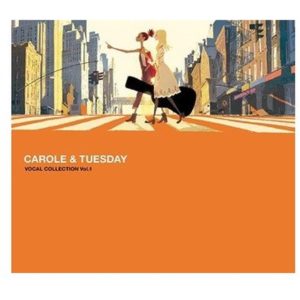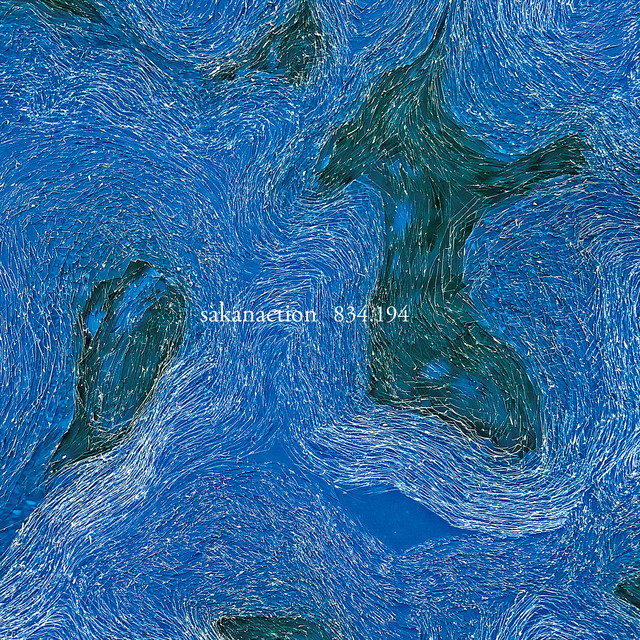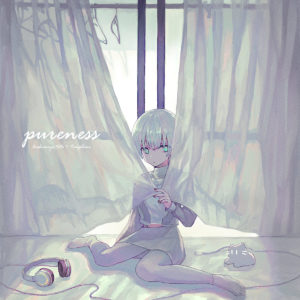Make Believe Melodies’ Favorite 2019 Japanese Albums: #50 – #41
At some point this fall, Make Believe Melodies turned ten. I’d known this decade milestone was looming — mainly because 2019 also marked my tenth anniversary of moving to Japan to work in the countryside teaching English to bored teenagers “for a year or two, tops” — and toyed around with ways to celebrate. Then life happened and…forget marking the occasion, even updating this blog fell to the wayside.
I wish I could point to some sharp and biting reason for this — Blogging is dead! Music journalism is on life support! Just like what you like, man! — but the real reason is far more boring. Life simply got in the way. I had a kid, work became far more outsized even before that became a reality and time suddenly became scarce in a way I never would have imagined when I started this in 2009 between repeat-after-me drills in far-off Mie. I’m thankful for all the above, but to make it work the starting point had to suffer (to the point I’m actually blogging about most of the same artists I would here over at Otaquest now because…well, that pays, and this has always been a not-for-profit site, first for personal beliefs but now because I have zero idea who would advertise for something like this).
All fall, I knew I still wanted to do this annual exercise — which, if you are new (welcome, thanks for reading that intro which probably confused you!) entails me, the only person working on Make Believe Melodies save for the few people who take pity on me to help with the WordPress nitty gritty, highlighting my personal favorite Japanese albums of the year. Thing is, I’m not sure what comes next. I’ve told myself “this is the week I find more time to blog” for most of the last three months, and then that tumbles down a chute. I’ve started seriously wondering if this site’s time has come…or, at the very least, having it mutate into something different, whether that’s fewer posting or becoming something else entirely (get in on the newsletter boom before that crashes?).
What keeps making me feel pangs of guilt and still pushes me to want to get back on this, however, is surveying Japanese music in 2019. I haven’t encountered a year as stacked for the country’s musical output in my time living in the country, to the point where I seriously came close to going wild and making this 100. Then I realized that the world probably doesn’t need to know Tacoyaki Rainbow made my 98th favorite release of the year and kept it a tad tighter. Still, so much fantastic stuff came out this year both on the top level of J-pop and in the indie-adjacent spaces this site primarily covers that I went into list season not having two or three favorites for the top spot, but closer to 11. On top of that…and here’s some industry side-eyeing for those seeking a touch of the dramatic…I believe English-language coverage of non-English music has mostly gotten worse over the decade since I started out, save for maybe Spanish-language music and some corners of K-pop (though…that’s a whole different door to open up). Congratulations to CHAI (on my list) and Otoboke Beaver (#54…told you it was cutthroat!) for grabbing Western attention, but there’s so much more happening here just totally ignored on a wider scale that deserves to be screamed about, even if it’s coming from some small dorky digital corner of the web. I guess my voice hasn’t gone out yet, at least.
Which brings us back to what I say every year…follow along, listen and see if you find something you love that normally wouldn’t hit your radar.
#50 Mikazuki Bigwave Hoshizora Romantic
The very idea of young Japanese artists being inspired by non-Japanese proponents of future funk to dig into their own country’s musical legacy to create hop-scotching internet dance music has always been a funny proposition. Yet at the same time this niche genre saw a split between creators evolving beyond the find-obscure-Japanese-disco-and-make-it-faster origins of the style and those choosing to stick with simply jacking ideas from scarce sources, Japanese future funk artists hit a stride, highlighted by kissmenerdygirl and Mikazuki Bigwave going up a level in 2019. The latter’s Hoshizora Romantic in particular highlighted tremendous growth, with the uptempo city pop-sampling crowd pleasers now joined by tracks drawing from less predictable places (the first voice you hear here? Courtesy of Hikaru Utada chipmunked up) and originals channeling French touch. They even dabbled in moody atmospherics on “Kaiki Sea Princess,” a track highlighting newfound openness. The same energy sticks around, but Mikazuki found new ways to get it flowing. Get it here, or listen below.
#49 SNJO Diamond
Another year, another chance to crack open all these books I bought about vaporwave and gush about Local Visions. No label or collective in Japan has been as consistent as this bunch, and if I did share that top 100, you’d see the likes of Feather Shuttles Forever and Upusen get some love. This isn’t the last time Local Visions will come up on this list, but SNJO’s Diamond does highlight a big shift from the 2018 crop of releases they gave the world. Those offered the perfect opportunity for mental gymnastics, playing around with internet iconography and the sounds of bubble era Japan in a way nobody else anywhere is. It’s thinkpiece fodder, and I love it. Yet in 2019, Local Visions’ artists weren’t as interested in stroking philosophical urges but rather leveling up to create damn catchy music. The Kyoto producer behind this project captures this well, using synth shimmers and machine beats to craft a collection of songs at time intimidating (“Graphite”) but mostly dazzling (“Fly,” “Alive”). Guests such as Sola The Luva and mukuchi added extra warmth to busy synth-pop, though SNJO’s own digi-glazed voice could carry this songs on their own. No reason to go too deep when the hooks just dig their way into your nogging so effectively. Get it here, or listen above.
#48 Teen Runnings Hot Air
The sonic palette Syouta Kaneko uses in Teen Runnings has changed dramatically over the past decade, but the angst at the center of his songs still comes through whether backed by distorted guitar or synths born to be in a Club Med ad. Hot Air finds Kaneko taking over the project entirely after years as operating as a band, and this shift resulted in cheery tropical sounds making up the bulk of songs such as “Hair Wax 95” and “Baby G,” with room for experimentation also nudging him towards uneasy plastic pop (“Smart Disc Promotion”) and rave ups (“Feeling Happy”). Yet all that sunshine sure could feel synthetic, and the one major carry over from early Teen Runnings albums and Hot Air was a far more downtrodden set of lyrics that used those seaside sounds as a foil to the downer vibes lurking within. Listen below.
#47 Lyrical School Be Kind Rewind
Give me an idol group offering up a loopy gimmick for their album, and you’ve got my attention. Now do the same, except said outfit actually can’t settle on what it is they are doing over the course of said release and that it comes with goofy skits that prove charming the more you hear them. Hip-hop idols Lyrical School presumably set out to make a set of songs centered around either movies or Michel Gondry — advance number “LAST DANCE” stuck to this, complete with Sweded video — but Be Kind Rewind goes all over the place, setting itself up as an “uninterrupted live performance” on the imagined Michael Matt’s Young Hit Studio, though it only takes six songs for a commercial break. Whatever is going on here…and dear goodness it gets absurd with the final skit…works, because variety looks good on Lyrical School, as they weave between boom-bap and dance pop (“Love Together Rap”). Songs feature all kinds of weird details that raise them above ’90s-worshipping tracks, while “Enough is school” and “Tokyo Burning” display more swagger than most major label doofs hoping people don’t notice they are biting Migos wholesale. This is idol pop done right — fun and at times bewildering, but always offering a new perspective on the familiar. Listen below.
#46 Haretokidoki Tsuioku No Nebula
Nostalgia can be complicated, or you can call up your most neon-soaked synthesizer melodies and create some bubble-ready earworms for a new generation to daydream over. The pair of Brinq and Misatsun make their inspiration clear on their debut full-length as Haretokidoki, drawing inspiration from 1980s idols like Wink and Miho Nakayama, with a few modern touches dropped in for good measure (though even the “smooth rap” courtesy of Ken Kobayashi on “Tell Me” feels very “Tokyo Tower” in its deployment). They do it so well, though, that it’s hard to knock them for being so obvious about it, at least when “Kiss Me” heart-races forward and captures nervous energy as well as any of those whirlwind pop hits could. Listen above or to two songs below.
#45 Sakanaction 834.194
There’s two really good albums lurking within the doubled-up package that is 834.194, and when those alternate reality releases poke through it’s tough to deny. It seems safe to speculate that Sakanaction either scrapped or just decided not to release something gathering all the singles they were putting out post Sakanaction, which saw them building on that one’s dance-meets-rock emotional catharsis via still-excellent cuts like “Eureka” and “Hachisu No Hana.” Then Ichiro Yamaguchi transformed into 2010s Sugiyama Kiyotaka and started morphing Showa sounds into modern blockbusters, with a healthy dash of humor thrown in to really push it through. On their own, these two sides of Sakanaction — teen-courting rockstars playing around with laptops, and Omega Tribe 2019 respectively — would make for great albums, and as one jumbo offering it still delivers plenty of peaks. It also just gets bogged down by some meandering electronic passages and ballads, so many ballads. It’s a best-of album where they had to scramble to justify the biggie-sized packaging. Those best-of moments, though, are better than a lot of band’s entire catalogs combined, and demand this one still land somewhere on the list. Listen below.
#45 Haruko Tajima kawaiiresist
Internet culture seeps over into almost all music released today, to the point where an artist completely rejecting the web’s impact or networking power for their music would probably be met with confusion. It’s not surprising to listen to long-running left-field pop spitfire Haruko Tajima let modern online culture totally subsume her latest album, but it is a little surprising to hear her do it so well. Like someone raised on Youtube suggested videos, she skips from Autotune-submerged rap to Velfarre-ready Eurobeat on late highlights “Astral Gal” and “TikTok Angels.” As that last number hints at, the lyrics also offer plenty of insight — or at least play around with ideas found — on life in the digital age, along with some new takes on Japanese street fashion (her current push — New Wave Gyaru). Even divorced of all that social media mumbo jumbo, it’s still a dizzying listen. Listen above, or get it here.
#44 Various Artists Carole & Tuesday Vocal Collection Vol. 1 + Vol. 2 + “Kiss Me” and “Polly Jean” Singles

The past ten years could really grind down one’s love of music if you didn’t keep cynicism at bay. Forget the industry around it itself — I spent large chunks of the latter ’10s bummed out hearing ideas that originally cropped up in SoundCloud-based dance music suddenly soundtracking YouTubers trips to Target, and generally feeling let down that music felt more like an extension of celebrity worship. Leave it to an anime to make me feel gushy about it all again. Shinichiro Watanabe’s Carol & Tuesday celebrates both music and the music industry in such surprising and heartfelt ways, without ever needing to cast any one sound or idea off as evil. While the main characters play keyboard and acoustic guitar, the show never turns into a “this is what real music is all about!” rant, instead giving plenty of nuance to the EDM producer, the digi-shined pop star and even the people working behind the scenes (they manage to make a plot about AI music complex, a fresh glass of milk after the overcooked TV dinner of seeing Zola Jesus and Grimes yelling at one another on Twitter). It’s not about what music matters, but that music matters.
It goes a long way by having actually good songs all over the series…and from artists very much in this blog’s comfort zone, both Japanese and international. These compilations don’t feature everything — contributions from Thundercat and Denzel Curry are absent, and I’d feel wrong not including the opening theme songs “Kiss Me” and “Polly Jean” which finds Nulbarich and Leo Imai penning effervescent pop that has mostly evaded their solo careers, and becoming some of 2019’s finest when the voice actors give it a go — but they get almost all of it, from Taku Takahashi and Banvox doing what they do best to Maika Loubte really flashing her potential via skeletal dance-pop…in French!. G.Rina pops up to pen a boogie jam sporting one hell of a guitar melody, and whoever composed those two fake fka Twigs songs, just incredible work nailing the vibe while also actually sounding catchy. It all ties back to the central point — nothing here is half-assed or presented as the “evil commercial song” but rather part of something bigger waiting to sweep you up in if you let it. Listen below.
#43 PellyColo Solar Powered + MouManTai EP
A Hollywood blockbuster doesn’t have to be automatically written off just because it’s stuffed so tightly, as long as the people making it deliver the goods in an enjoyable way. PellyColo’s Solar Powered could be a Rise Of Skywalker type of wreck in the wrong hands, an hour-seventeen-minute slow burner built around an 80’s sound palette and sci-fi references. Yet anyone who worked closely with Especia can’t miss, and despite a long run time PellyColo nails almost every second of it. He’s at his best when shrugging off any ironic posturing to deliver bounce-along pop anthems such as the title track and “Feel That Fire,” the latter begging to be DeLoreaned back to appear over some kind of training montage. Just as important are the small moments that make everything flow smoothly, whether in the form of “Can I Help You’s” grocery-store-ready bliss or “Strike Now’s” funk sprint. PellyColo does so well that the following MouManTai EP feels like a welcome expanded edition. Get it here, or listen below.
#42 Templime And Hoshimiya Toto Watertank EP + pureness
The past 12 months saw Templime really gain some steam in the world of udnerground Japanese dance music, with their work done in collaboration with singer/Virtual YouTuber? Hoshimiya Toto, who adds warmth to their colorful take on garage. This set of EPs highlights their potential, especially when working alongside a great voice, but they really crash the list because of “Take Me Out.” It was a fantastic year for Make Believe Melodies’ favorites putting out mesmerizing singles — Seiho’s “I Feel Tired Everyday,” Perfume’s “Saisei,” Oomori Seiko getting the chance to show the world what her mind looks like on Hello! Project — but these relative newcomers came out with my favorite song of the year, a 2-Step number beating nervously just in time with Toto’s lyrical longing. It’s resigned and a little bit deafeated, but still giving itself over to the thrill of those seconds where it all seems possible. It’s also a triumphant reminder of the netlabel ethos pumping through Japanese music (stay tuned…) and a hell of a greeting from a promising trio of artists. Get them here or listen below.
#41 Spangle Call Lilli Line Dreams Never End
Everything vanishes in what seems like a flash, and it sometimes feel like all we can do is keep pushing for that one brief time in the light. What will be your “Damn, Daniel” moment, what will be your “Old Town Road,” what will be your TikTok set to nightcored Koda Kumi? Can you even manage that? Spangle Call Lillie Line present an alternative path to art and maybe living in general if you really want to overdo it (hi there). They’ve been prodding at the same guitar-based sound for over two decades now, and the music on Dreams Never End sounds distinctly them. Yet as they’ve done for all of the 21st centruy, the trio keeps playing around with this formula, seeing how much they can strip away and what small new additions — a new rhythm-machine beat here, some organ wooze there — can fit into there world without losing the melancholy feeling of walking around a Tokyo suburb at dusk wrestling with all those thoughts that don’t change. Maybe they say it best here…after all these years, they are “still three,” and still figuring out what they can do. Listen above.







